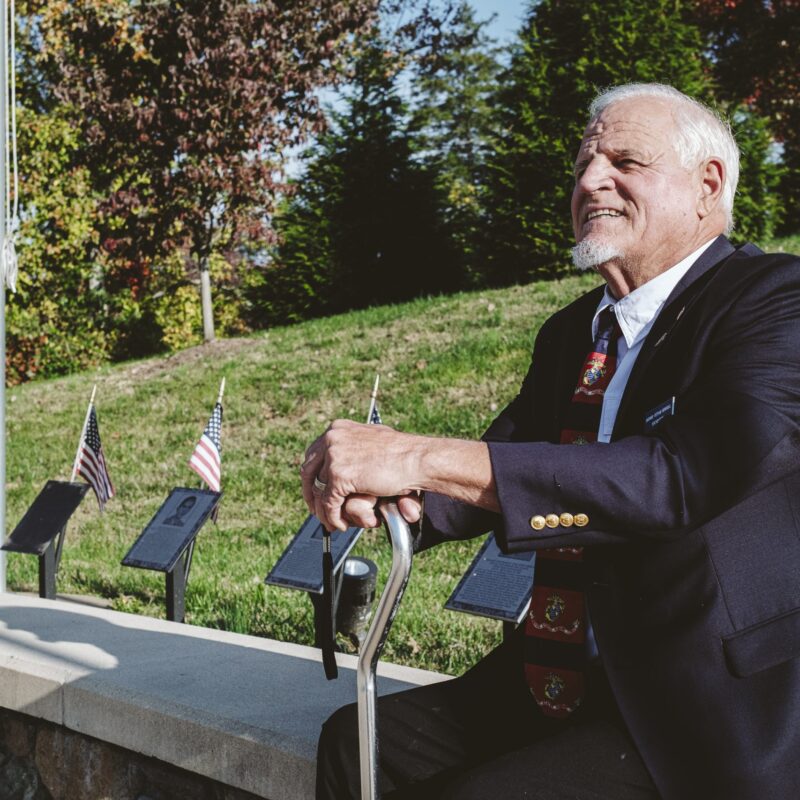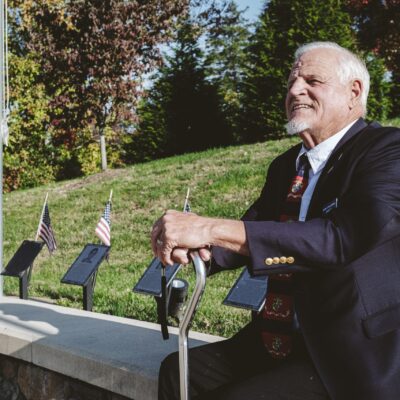If Creigh Deeds becomes Virginia’s next governor, it will be in spite of himself.
If, in a shocking turn of events, Virginia voters elect Creigh Deeds the Commonwealth’s next governor next week, Deeds will have a lot of thanking to do. In the waning weeks of the campaign, the job has increasingly fallen to others to make the sale for Creigh Deeds.
READ MORE• Click here to hear from your local candidates • Click here to read more about the Democratic ticket • Click here to read more about the Republican ticket |
The long thank-you list will include: Bill Clinton. Mark Warner. Tim Kaine. Tim Kaine’s wife, Anne Holton. Al Gore. Terry McAuliffe. Several newspapers, but especially The Washington Post. A slew of state and federal legislators. Thousands of Democratic activists. Organizations like Black Women For Obama For Change. And, of course, Barack Obama himself, who rallies for Deeds today in Norfolk.
Even with all those heavy hitters, the prospects of a Deeds victory look slim. His Republican competitor, Bob McDonnell, leads in every poll, by a margin of 8 to 19 points.
How did a state that’s becoming increasingly blue—a state that has had and liked two Democratic governors in a row, that has elected two Democratic U.S. senators in the last three years to replace Republicans, that opted for Barack Obama over John McCain—how is it that Virginia will likely pass over an earnest moderate Democrat from a rural county for a former foot soldier of the culture wars?
It has a little to do with the economy, a little to do with Bob McDonnell—and a lot to do with the limitations of candidate Creigh Deeds.
"A nobody from nowhere"
The situation didn’t always look so bleak for State Senator Creigh Deeds. In fact, just last month, he was neck and neck in the polls. The momentum was with Deeds when he showed up September 19 in Charlottesville to kick off a local canvassing effort.
|
Creigh Deeds |
Deeds’ campaign organization has at times resembled his speech—haltering and discombobulated—but despite short notice, the Downtown Mall office was packed with a crowd that blended the old and the young, local campaign vets and newbies still buzzing from “Yes we did.” Charlottesville’s political elite was there, from Maurice Cox to Kristin Szakos.
In blustered David Toscano, Charlottesville’s state delegate and former mayor, showing Deeds off like his prize chicken. “We’ve got a wonderful ticket, we’ve got a wonderful leader, so let’s get to it. I want to introduce to you the future governor of the Commonwealth of Virginia, Creigh Deeds!”
And there was Deeds, the top of the ticket, the next governor. He looked like a governor—thin, but not too thin, a big smile on a tan, handsome face, a good head of brown hair for a 51-year-old, just his sideburns tipped in silver.
As he had entered the room, he had shaken hands like a governor, gripping every paw in sight, his head bobbing constantly in appreciation of the support. He was dressed like a governor, not too immaculate but business-oriented in his well-pressed blue shirt and black slacks.
Only, he did not quite talk like a governor.
At first, Deeds was hard to hear. The audience was quiet and attentive, but no one had bothered to turn down an office television that was blaring a speech by Barack Obama. Deeds had to compete with the president in order to be heard. The oratorical comparison did not favor the state senator.
“It’s not good enough to win—it’s not good enough to win Democratic areas like Charlottesville—we need to increase the turnout several percentage points, and the only way that’s going to happen is the hand-to-hand combat,” said Deeds. “Forty-five days is not a lot of time, but it’s enough time to let people know that this election is critical, the choices are stark, it’s about the future of the Commonwealth of Virginia: Do we build on what Mark Warner and Tim Kaine have done or do we stop and go back? We will, we will!”
What he said was true enough, and the room’s enthusiasm ensured applause levels appropriate to a man who wants to be governor. Deeds, after all, was in Charlottesville; people know Creigh Deeds in Charlottesville.
After the speaking was over, Deeds set off for the City Market. There he did not have to give a big speech. He could play to his strengths—shaking hands, looking gubernatorial and not offending people. Farmer Tony Lagana encouraged Deeds to pass legislation to allow the sale of raw milk and tried to push a box of potatoes into his hands. “You going to have a root cellar in the governor’s mansion?” Deeds seemed charmed, but refused the potatoes.
Still, the talking wasn’t quite over. Rob Brown and his wife cornered Deeds for a few minutes on health care. “I’ve been a life long conservative and Republican, but something’s got to be done about health care,” said Brown, a farmer, after talking with Deeds. “I’m paying almost a thousand dollars a month and have never been sick. I was kind of hoping he would give me a little more answers, it’s the same stuff you hear over and over and over. I guess it’s an awful hard thing to do, but it doesn’t seem like it should be.” Despite defining himself as Republican, Brown voted for Democrat Tim Kaine in 2005. He didn’t know if he would vote for Deeds.
|
Bob McDonnell |
Deeds also got a little advice. “He needs to wear a white shirt. His sweat shows in his blue shirts,” said orchid vendor Kathy Philhour, as she watched Deeds disappear into the crowd. “I’ll vote for him, but I’m nervous. McDonnell looks smooth. Deeds looks under siege,” she fretted. “I wish Emily Couric was still here.”
Robert Creigh Deeds sometimes calls himself “a nobody from nowhere.” In Charlottesville, Deeds has been known, accepted and gradually admired since 2001, when he arrived from nowhere (technically Bath County, in between Staunton and Covington along the West Virginia border) to win the Democratic nomination for the state senate seat that opened up after the much-beloved Emily Couric died of pancreatic cancer at age 54. An attorney and state delegate, Deeds was a strong gun rights supporter without liberal bona fides—more moderate than many Charlottesville Dems would like on issues like gay rights. But he was seen as the best candidate to win over the rest of the district, and he didn’t disappoint, beating the Republican by a 2-1 margin in the special election.
His star ascendant, Deeds won the Democratic nomination for state attorney general in 2005, where he faced a smooth talking, square-jawed Republican state delegate from Virginia Beach named…Bob McDonnell. The race was the closest statewide contest in Virginia history—after a recount, McDonnell won by 360 votes, 0.0002 percent of the nearly 2 million votes cast. It was the first time Deeds had ever lost a race.
Because in Virginia the governor is limited to one four-year term, the line forms early. By 2007, it was widely known that both Deeds and McDonnell wanted a crack at the governor’s mansion in 2009. McDonnell, however, sorted it out with other ambitious Republicans (he worked out a deal with lieutenant governor Bill Bolling, who’s running for re-election), while Deeds looked like a long shot just to win the primary.
Deeds prepared to take on State Delegate Brian Moran of Alexandria for the Democratic nomination. Then, late in 2008, the gale force wind known as Terry McAuliffe blew into the Democratic race for governor. McAuliffe, Democratic strategist and longtime advisor to the Clintons, brought with him a Rolodex worth millions in fundraising ($8.3 million in fact) as well as the campaign know-how to structure a top-notch campaign organization. Sooner than Deeds can say “factcheck dot org,” McAuliffe rolled out initiatives about jobs, energy and transportation designed to appeal to the Democratic primary voter.
Deeds recognized the challenge. “Besides being a legendary fundraiser, Terry is also a bright guy who’s a world class speaker,” says Deeds. “You know, people make fun of me sometimes because I somewhat, sometimes stutter a little bit, and tell stories about living in the country, and the mannerisms I have, and Terry has been on ‘Meet the Press.’”
And then The Washington Post gave Deeds the first of many gifts: an endorsement. Unable to compete with McAuliffe and Moran for TV time in NoVa, Deeds got quick name recognition in the state’s most populous region.
“In 18 years in the General Assembly, Mr. Deeds has time and again supported measures that might be unpopular with his rural constituency but that are the right thing to do, for Northern Virginia and the state as a whole,” wrote the Post’s editorial board. “…Mr. Deeds may not be the obvious choice in the June 9 primary, but he’s the right one.”
Deeds calls the endorsement “unbelievably important:” “What this said to [doubters in the rest of the state] was, ‘He’s being taken seriously by the people in Northern Virginia.’”
In the June primary, Deeds didn’t just eke out a win—he crushed it, winning 49.7 percent of the vote to McAuliffe’s 26 and Moran’s 24.
But in the summer, he had to start fundraising from scratch. Though he spent less than McAuliffe and Moran, he had emptied his coffers of $3.5 million, and had to restock. Late in the 2005 race, Deeds had to divert money he planned to spend on lesser TV markets like Charlottesville and Bristol in order to match McDonnell in Northern Virginia. One of the takeaway lessons: Raise more money.
McDonnell, meanwhile, had a full tank and got started early on advertising. The recession was ending, according to economists, but the jobless rate was still high, as was skepticism about Democratic health care reform. By August, McDonnell had a 12-point lead.
Add to that Virginians’ historical contrariness—since 1973, the Commonwealth has elected a governor from the opposite party of the one in the White House—and it looked like McDonnell’s to lose.
The gift from God (or at least Ronald Reagan)
That’s when the Washington Post came to the rescue. Again.
Bob McDonnell earned a law degree as well as a master’s in public policy from what is now called Regent University, a particularly conservative Christian school in Virginia Beach founded by Pat Robertson. In 1989, for credit for both degrees, 34-year-old McDonnell wrote a thesis entitled “The Republican Party’s Vision for the Family: The Compelling Issue of The Decade.” Though McDonnell has been in public office since 1992, no one bothered to read the thesis until The Washington Post dug it out of the Regent archives for a front-page story that it published at the end of August.
The thesis called for public schools to teach “traditional Judeo-Christian values,” state government to make it harder to get a divorce, and the federal government to eliminate tax credits for child care expenses because they incentivized women to join the workforce.
“Further expenditures would be used to subsidize a dynamic new trend of working women and feminists that is ultimately detrimental to the family by entrenching status-quo of nonparental primary nurture of children,” wrote McDonnell. The thesis had plenty such gems, including that the Supreme Court fouled up by disallowing states to regulate contraception.
The thesis was just what the Deeds campaign had been searching for. Ever since winning the primary, Deeds had been trying to paint McDonnell as a social conservative cretin, more interested in outlawing abortion than creating jobs. Yet McDonnell, who didn’t have an opponent to beat for the GOP nomination, had the luxury of drifting center rather than wooing the base. He tried to play down the thesis when contacted by the Post, calling it “a decades-old academic paper I wrote as a student during the Reagan era and haven’t thought about in years.” In a recent debate, McDonnell dismissed it, misleadingly, as a “college paper.”
But the thesis succeeded in making McDonnell’s past relevant in the present. The Deeds campaign decided to go all out, and the thesis became the lynchpin of its strategy, the focus of its ads and speeches. It encouraged supporters to hold “book clubs” to get the word out.
In mid-September, the strategy appeared to be working, particularly with women who didn’t identify with a party. Polling in August for The Washington Post showed independent women favoring McDonnell 59 to 31 percent; in September polling, that group swung to Deeds 50 to 47. Overall, the gap among likely voters had narrowed to 4 points in McDonnell’s favor from 15 points in August. Other polls reflected a similar trend; Rasmussen showed McDonnell with only a 2-point lead.
Enthusiasm, neck-and-neck poll numbers, and a God-sent weapon to employ against the opponent. All Deeds had to do, it seemed, was what he has long had a reputation for doing—out-sweating his opponent to the finish line in order to lock up those last few votes.
Deeds vs. words
There was one major problem with that analysis. Voters like to vote for people, not just against them. Polls showed voters were having a hard time figuring out why to vote for Deeds and not just against McDonnell. The focus on the thesis, along with McDonnell’s counterattack, was leaving 56 percent of likely voters with the impression that Deeds was running a negative campaign, according to a Washington Post poll released October 9. By mid-October, even Democrats like Kaine and McAuliffe were begging Deeds to make the sale.
Deeds has campaigned on the slogan “Deeds not words,” but words are awfully important when it comes to politics. Deeds has amassed the usual stock of “plans” to sell—a promise to convene a special session to deal with transportation; discount tuition for in-state students with good grades in exchange for two years of service; a tax credit for businesses that create jobs—but he has not effectively sold them.
Take his transportation plan versus Bob McDonnell’s. Virginia needs about $1 billion more per year, according to transportation experts, in order to properly fund both transportation maintenance and construction. McDonnell’s plan involves a potpourri of funding sources, most of them dependent on either rosy assumptions about future growth or a willing legislature—surplus revenue, privatizing state liquor stores, money from off-shore drilling, allocating less to transit. Deed’s plan is much simpler: force the legislature to work out a plan in a special session, even if it involves a tax increase somewhere along the line, such as to the gas tax. If the bill fits the need, and gets bipartisan support, Deeds says he’ll sign it.
Deeds has staked a lot on transportation, calling it the biggest issue facing Virginia. The Post, in recently endorsing Deeds a second time, heaped praise on his plan while calling McDonnell’s a “political non-starter.” In endorsing McDonnell, The Daily Press lamented that he didn’t have a better transportation plan.
And yet: Polls show likely voters trust McDonnell more on transportation. An October 13 Rasmussen poll showed that margin narrowing, but McDonnell was still favored 43 percent to 37 percent.
Why? No matter how much better his plan, Deeds’ articulation often leaves would-be voters in doubt. Deeds seems shifty while McDonnell seems straightforward, even if the content of what they’re saying reveals the opposite. It lead Washington Post columnist Robert McCartney call Deeds “a poor salesman of superior wares.”
The McDonnell campaign has quickly exploited a few instances where Deeds fumbled his way into seeming contradictions. The most famous came after a September 17 debate in Fairfax. Reporters wanted clarification about his transportation plan. Would he raise taxes or not?
Post Columnist Robert McCartney: “When you said in the debate, I’m not going to raise taxes, what did that mean?”
Deeds: “What that meant in the general sense of the term, I’m not going to, I’m not going to raise general fund taxes. I know we’re going to have to raise money for transportation.”
McCartney: “So you’ll raise other kinds of taxes?”
Deeds: “I think I, eh, uh, I meant what I said, I have, um, no plan to raise general fund taxes.”
McCartney: “So what taxes would you raise?”
Deeds: “We’re gonna, we’re gonna, we’re gonna—everything is on the table when we consider how we raise money for transportation.
Fredericksburg Freelance Star Reporter Cheylen Davis: “Is the gas tax a general fund tax? Does the gas tax go to the general fund?”
Deeds: “The gas tax goes to the transportation trust fund.”
Davis: “So it would not then be covered by not raising general fund taxes?”
Deeds: [Pause, reddening] “I think I’ve made myself clear young lady.”
Davis: “I’m sorry, Creigh, I’m not trying to be mean, I just don’t quite understand.”
Quickly, a video of the exchange was posted to YouTube, and McDonnell’s campaign created web ads linking to it, used both to show Deeds’ lack of clarity on taxes as well as how he seemed to lash out at a female reporter—i.e., look who’s hating on working women now. Deeds apologized, and Davis said she took no offense, but the damage was done. Despite trailing in the polls, Deeds has been the one declining invitations to debate and even at noncombative “candidates’ forums” has refused to share a stage with McDonnell.
Deeds’ speech is often described as “folksy.” Deeds does revert at times to country expressions, and his accent has a particular over-voweled twang, but his style is far from common no matter what part of the state, thanks in large part to his propensity to stammer and redirect his sentences midstream. Deeds’ speech lacks fluidity—it halters and creaks and then comes to an abrupt halt. Sheila Johnson—co-founder of cable TV channel BET, Obama supporter and major donor to UVA’s Curry School of Education—endorsed McDonnell, in part because of his communication skills. Moreover, she mocked Deeds’ stutter at a fundraiser. The Deeds campaign used it as a fundraising tool while calling for and getting an apology from Johnson (though not one from McDonnell), but in doing so, it also publicized Deeds’ stammer and made it an explicit part of the race.
Here’s an excerpt from Deeds’ opening statement at a candidate’s forum at Virginia Union in late September: “If you don’t participate, if you don’t demand what you want, you get what you deserve, all Americans—ought to participate, all Americans have a responsibility to demand what they deserve. Representative democracy is a partici—patory sport.
Um, last year was, a pretty remarkable thing happened. Seventy-four percent of the people in Virginia turned out to vote and demanded historic change, demanded historic change and a remarkable thing happened. The job never gets finished. Participa, participatory Democracy requires that we stay at the wheel with vigilance at all times, and this year is important.”
At this event, before a largely African-American audience, a smoother politician would have made explicit what Deeds hints at—that Barack Obama’s election was a remarkable thing, but if you’re excited by the change he promised, this year you need to get out and vote for me.
In sharp contrast to Deeds, McDonnell has a deep voice and rarely stumbles. He knows how to maneuver within an answer to avoid a direct response and get to his talking points. At that Virginia Union forum, he avoided answering whether he would outlaw abortion if he had the choice, and talked up his agreement with Barack Obama at every opportunity (they both like charter schools). With his awareness of his audience, and the propensity to talk around a straight answer, McDonnell is the quintessential smooth-talking politician. (McDonnell’s staff did not make him available for an interview with C-VILLE.)
The speaking contrast doesn’t always favor McDonnell. Deeds often comes across as the more genuine of the two, both because he’s more likely to directly answer a question and because his fumblings often heat up into an enthusiastic pitch that’s appealing. But the beating Deeds has taken from the polls, Democratic bloggers and the press—not to mention his opponent—has at times tempered that enthusiasm.
On October 7, Deeds returned to Charlottesville, to speak to UVA students about his higher education proposal. It should have been an upbeat occasion with a big crowd—an on-campus appearance by a candidate for the state’s highest office less than a month before the election, there to talk about an initiative to make college more affordable for in-state residents. At a university of 20,000 students, surely at least 100 would come see a Democratic candidate for governor.
Yet only a handful showed, outnumbered by both the press and Deeds’ entourage. It didn’t help that the event was announced less than 48 hours in advance, or that it was held in a windowless classroom in Ruffner Hall.
Instead of mustering his usual enthusiasm, Deeds seemed tired. He dutifully explained his idea—in-state students with B averages would get 50 percent off tuition if they spend two years in broadly defined public service after graduating. He answered two questions. The event ended in 15 minutes.
Campaigning politicians often have signature anecdotes, and as Deeds stood before all those empty seats reciting his summer camp anecdote for the umpteeth time, it conveyed a melancholy I had never heard before.
“Uncle Frank would tell the campers, ‘Boys, now you’re going to get out of this camp exactly what you put into it.’ When I was 7 years old, I had no idea what that old man was talking about. But the older I’ve gotten, the more I’ve realized that that’s the lesson of life—you’re either all in, or you’re not in at all. People that know me, know that I’m all in in everything I do.”
At that moment, however, Deeds just didn’t quite sound like he was all in. And it didn’t look like enough Virginia voters would get to know him in time to know better.
Once again, Obama = Hope
Since becoming president, Barack Obama has tried his hand at, among other things, keeping us out of a deeper recession, salvaging the auto industry, reforming health care and establishing peace in the Middle East. Now, this year’s Nobel Peace Prize winner will try to save Deeds’ campaign for governor, lending himself to TV ads and an appearance at Old Dominion in order to woo voters to Deeds.
At this point, Deeds desperately needs Barack Obama to invigorate his 2008 supporters—particularly those either black or young—to march on Virginia’s precincts and chose Deeds. Deeds’ campaign is optimistic that polls are wrong because the pollsters don’t consider those who voted for the first time in 2008 as likely voters.
“We’ve been calling them our sleeping giants,” said Deeds campaign manager Joe Abbey. “They’re not showing up in the polls, but if they show up at the polls on Election Day, then it will be game over.”
A Deeds victory in turn bolsters the White House, but for a while, it didn’t appear as if Obama would come at all. Obama advisors were coy when asked in mid-October. “The most precious commodity we have is the president’s time, and we have to appropriate it on a rational basis between now and Election Day,” David Axelrod, Obama’s senior advisor, told The New York Times. The Deeds campaign had to downplay rumors that Obama was steering clear of a sinking ship.
Early in the race, it wasn’t clear Deeds wanted to be linked with Obama. Asked at that September 17 debate in Fairfax whether he considered himself an Obama Democrat, Deeds replied that he was a “Creigh Deeds Democrat.” It sounded like he was distancing himself from the president.
As is so often the case with Deeds, what he says he meant and what it sounded like he meant were two different things.
“I wasn’t distancing myself from anybody,” says Deeds. “I’m not going to say that I’m anybody else’s Democrat. I’m my own person. And if I’ve got faults, I’m not going to put them off on Barack Obama and say, ‘Well, it must be because I’m an Obama Democrat.’
“I’ll take responsibility for who I am.”







